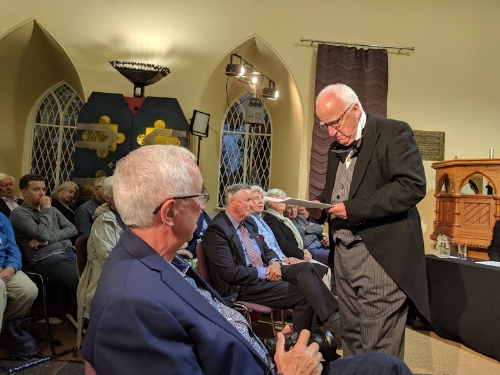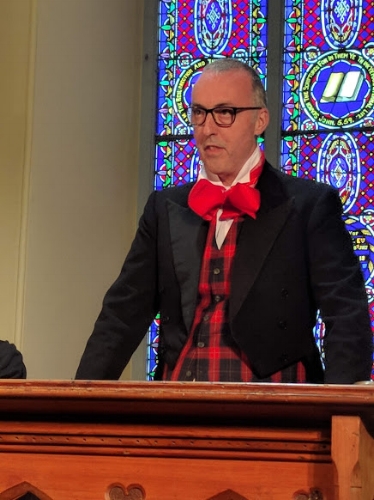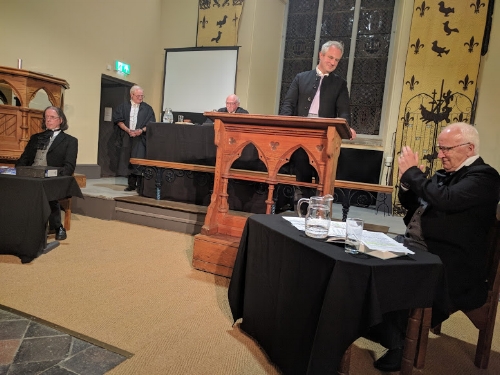D'Arcy McGee on Trial for Treason
/Given my interest in treason and the legacy of Joe Willcocks, I was very interested in seeing how Thomas D'Arcy McGee would fare on trial before a jury of his... well, not his peers, exactly, given that his jury was very much alive while he, the witnesses, and the court officials were not!
The Trial of D'Arcy McGee, a play by Anthony G. Russell, was performed by the Newpoint Players of Newry, Ireland, as part of the 2018 D'Arcy McGee International Forum in Carlingford, McGee's birthplace. It followed a successful format that Russell had established with The Trial of Padraig Pearse and The Trial of the Orange Order in previous years when the forum was called the D'Arcy McGee Summer School.
The format brought McGee back from the dead to account for his betrayal of his early republican ideals of the Young Ireland firebrand 1848, and his urging the death penalty for any Fenian officers captured during the invasion of Canada in 1866. Presiding over the trial was Larry McArdle as Judge Dionysus Cronos, an eternal judge who established that he had been present at the trial of Socrates, and serves in the jurisdiction of The Court Of History. The protocol of an earthly court loosely applies -- with a wonderful addition of references to pop songs and the poetry of Seamus Heaney.
Canadian lawyer Dermot Nolan, author of his own play on the assassination of McGee, It's Morning Now, performed as the barrister for the defence. The long-dead attorney was an individual who, like McGee, had moved on from early Irish radicalism to become an outstanding citizen of the British Empire: Gavan Duffy would go on to become Premier of Victoria, Australia.
"Charles Gave-in Duffy," taunted the prosecuting attorney, John Mitchel -- another colleague of McGee from the rebellion days. Unlike McGee and Duffy, however, Mitchel never lost his hatred for the British and eventually became an outspoken supporter of the Confederacy and an upholder of slavery in the United States. Mitchel was played with fierce passion by the play's director, Donal O'Hanlon.
The judge gave Duffy and Mitchel considerable leaway to launch ad hominem attacks on each other, giving the "jury" a broad perspective on the growth and evolution of 19th century personalities and politics.
Among the witnesses for the prosecution was summoned Sir John A. Macdonald (SJAM). Although he was a close friend and admirer of McGee in real life, SJAM was called upon to establish the evidence that McGee had called for the execution of Fenian leaders -- considered by the prosecution as de facto evidence of his treason. Lowry Hodgett played SJAM as a short-tempered, irascible individual, impatient to get past the Irish backstory and on the the Canadian part of the trial. One of Macdonald's most remarked-upon qualities of his day, however, was his charm and his likability. He became Prime Minister because he was so good at bringing people together around his winning personality.
I mention this because Sir John A. is under attack in Canada these days, and it helps us to remember that the founder of Canada's confederation was a man who would be appalled that so many of his intentions are now taken out of context. Last week, his statue was removed from outside the City Hall of Victoria, BC, and the Scottish Government removed reference to him and to Sir John A's Great Canadian Kilt Skate from its website. As with SJAM, so John Mitchel's statue in nearby Newry, his hometown, has come under scrutiny as a result of his support for slavery.
The chief witness for the defence was D'Arcy McGee's widow, Mary Theresa Caffrey, played by Diane Russell. As a playwright and author, Anthony G. Russell has a particular sensitivity to the women who were the guiding lights behind men who rose to prominence. His biography of John Mitchel, Between Two Flags, highlights the relationship between the Irish firebrand and his wife, Jenny Verner.
Mrs. McGee's testimony about the character and integrity of her husband preceded the summations where, once again, Mitchel argued that McGee's erratic and oft-changing position on the key issues of the day culminated in treason to Ireland, while Duffy upheld McGee's sincerity and conviction in seeking the truth even if it meant changing his mind on his past opinions.
The verdict was thus left in the hands of the jury -- some 60 members of the audience who were given pieces of paper on which to write "Guilty" or "Not Guilty."
The trials of famous people previously written by Russell and directed by O'Hanlon have often resulted in close verdicts -- both in Carlingford and elsewhere in Ireland and across Canada where they have been performed. Padraig Pearse, for example, was prosecuted by McGee and defended by Mitchel two years ago, and the verdicts came within a few votes either way -- usually finding Pearse Not Guilty. (I personally would be inclined to condemn, but that's the subject for another blog.)
Perhaps it should be no surprise, though, that at an international gathering to consider McGee, his legacy, and the issues of our day, the final count came in with a rounding exoneration: Not Guilty 52; Guilty 2.
The cast of The Trial of D'Arcy McGee included: McGee- Stephen McCourt; Mrs McGee- Diane Russell; Mitchel- Donal O’Hanlon; Gavan Duffy- Dermot Nolan; Sir John A- Lowry Hodgett; Judge- Larry McArdle; Clerk- Tommy Fegan; Jury Chairperson- Tom Kelly; Singer- Anne Tracey; Author- Anthony Russell; Director- Donal O'Hanlon.
To celebrate his acquittal and to enjoy an evening of music and craic, cast and audience repaired to the Carlingford Arms pub where, much as McGee would have done, the revelries lasted long into the night.



















